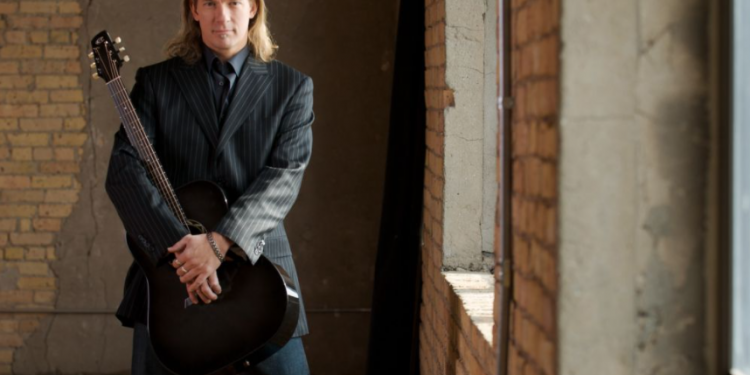By Ian Hebeisen
When talking with Amy Zellmer on the Faces of TBI Podcast, world-renowned guitarist McLaughlin described his focal dystonia by saying, “The trouble is in my fingers, but the problem is actually in my brain, and the inability of my brain to talk to my fingers individually.”
McLaughlin has built quite a career since he started touring in 1988, producing over a dozen albums in that time. Not only has he appeared on Billboard’s Top 10 Charts, he’s also received five Minnesota Music Awards, three National Campus Entertainer of the Year Awards, and an Emmy. But in 1999, his illustrious career faced its greatest challenge yet: a neuromuscular disease known as focal dystonia.
Often misdiagnosed as cerebral palsy, dystonia is a blanket medical term that encompasses several different conditions, each one involving some sort of muscle contraction and contortion. Generalized dystonia effects the entire body, while cervical dystonia causes abnormal twisting in the neck. Other forms of dystonia may affect the vocal cords, the eyelids, and other parts of the body.
As for McLaughlin, his focal dystonia targeted his right hand. McLaughlin noticed he was having trouble playing his music correctly. Unsure of what the problem was, McLaughlin began seeing various hand specialists. “I went to hand doctor after hand doctor. They said, ‘We can’t find anything wrong,’” said McLaughlin. Many of the doctors believed his condition was psychological.
Oftentimes, people who receive traumatic brain injuries will develop some form of dystonia, possibly weeks or months after the initial incident. For example, someone who walks away from a bad biking accident may find themselves contorting their neck afterwards. As for McLaughlin, he is unsure if a specific event caused his dystonia. “I remember being in a car crash in my high school years, but all of my development of my technical skills happened after that,” said McLaughlin.
In time, McLaughlin turned to the Mayo Clinic and finally began making steps towards a diagnosis. Following a day of appointments, a neurologist identified McLaughlin’s condition. “It was an important step for me because it had been such a mystery,” said McLaughlin.
The diagnosis led to Botox treatments at the National Institutes of Health in Bethesda, Maryland. Unfortunately, the injections did not work effectively, and McLaughlin started looking into other possible remedies. “It was very clear that there wasn’t any kind of pill … that would help you with this,” says McLaughlin. “A couple other treatments … didn’t sound attractive to me, like denervation, where they go in and snip the nerves.”
It became apparent the focal dystonia would not simply go away with treatment, so McLaughlin turned back to music. As a musician, McLaughlin’s focal dystonia appeared very task specific: he could operate a fork and knife fine, and he could use a comb and other handheld objects, but “The minute I pick up that guitar and assume that certain posture, things go completely haywire.” Determined to continue playing, McLaughlin decided to adapt to the limitations of the focal dystonia.
All his life, McLaughlin played his guitar with his right hand. Now that his playing hand kept contorting, he flipped the guitar around and began teaching himself to play left-handed. “It took a long time for me to get good on the guitar right-handed. But I thought to myself, well, what if I could get good at it left-handed?” McLaughlin developed a tapping style of guitar playing, and with some patience and determination, found himself playing the guitar once again.
This amazing display of neural plasticity not only allowed McLaughlin to overcome his dystonia, but also permitted him the opportunity to put his career back on track. In addition, McLaughlin started raising awareness for dystonia in all forms by serving as an ambassador for awareness for the Dystonia Medical Research Foundation.
In 2010, McLaughlin earned another award to showcase his illustrious career: the Public Leadership in Neurology Award, whose previous winners include Paul Allen, Julie Andrews, Leon Fleisher, and Michael J. Fox.
Ian Hebeisen graduated from Saint Mary’s University in May 2020, earning a degree in Literature with a Writing Emphasis. Now living in the Twin Cities, Ian writes comics, graphic novels, and poetry. In his spare time, he enjoys playing board games with his family.
You can listen to this episode of Faces of TBI on iTunes or wherever you listen to podcasts.











